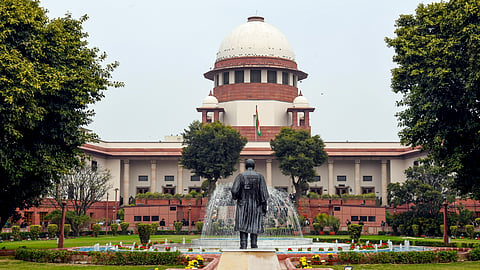

NEW DELHI: The Supreme Court on Wednesday asked the Odisha government to decide the remission plea of convict- Ravindra Pal alias Dara Singh, who is serving a life sentence for the murder of Australian missionary Graham Stuart Staines and his two minor sons in Keonjhar district in Odisha in 1999.
The convict, Singh, in his application, filed before the apex court sought more liberal remission policy to ensure his premature release from a prison in the state where he is lodged for more than 24 years and 11 months.
During the course of the hearing on Wednesday, a two-judge bench of the apex court, headed by Justice Manoj Misra and Justice K V Viswanathan asked the Odisha government, to take a decision on Singh's remission plea in six weeks and apprise the court.
Advocate Shibashish Misra, appearing for the Odisha government has to file the reply in the top court in the next date of hearing in the case.
The top court on July 9, last year, had issued notice to the Odisha government on the plea for Singh's premature release.
Singh in his plea said, he was seeking mercy from the top court and added tht he assured to "give back to the society" through "service-oriented actions".
Singh sought a direction from the Odisha state government to be released from jail immediately in accordance with the guidelines for premature release of life convicts issued in 2022 in the three cases in which he was convicted.
Singh, through his lawyer, requested the apex court to implead the CBI as one of the parties/respondents in the case, saying that it was the investigating agency in the brutal murder case.
In one of the earlier hearings, Mishra submitted to the apex court that the premature release of the convict should have been considered by the competent authority.
"There are five committees that dealt with the premature release of the convict (Singh). The latest report of the committee is of February 20, 2023," Mishra had told the apex court. He also said that he would later place all five committee's decisions regarding convict's remission to the apex court.
The Bajrang Dal activist and convict, Dara, serving life imprisonment in the brutal murder of Australian Christian missionary, Staines, and his two minor sons had in July last year moved the Supreme Court seeking remission on the ground that Rajiv Gandhi's killer has been granted mercy and was released accordingly and thereby he should also be released similarly.
Vishnu Jain, lawyer for Singh, in the plea, sought release of Singh from the jail, citing the judgement that granted mercy to the convict in Rajiv Gandhi assassination case. "I am seeking a direction to be released from jail on this ground," Jain said.
Citing the remission case of, Rajiv Gandhi's one of the killers, A G Perarivalan, who was directed to be released by the apex court in 2022, Singh sought remission.
Narrating the theory of reformative justice, summarised in the words of the eminent jurist and a former Judge of the Supreme Court Justice V R Krishna Iyer, Singh said, "Every saint has a past, every sinner has a future."
Singh in his plea said that he repented the offences as he was then "overwhelmed by distress at the barbaric deeds inflicted upon India by the Mughals and the British".
Singh, in his plea, sought remission and alleged that the state authorities had failed to address several representations sent for his remission and premature release, jeopardising his right under Article 21 of the Constitution.
Justifying that he should be granted remission, as he has already undergone more than the qualified period of jail setence of 14 years and more, as stipulated in the remission policy of April 19, 2022.
"I am around 61 years age. I have never been released on parole," Singh, who originally hailed from Auraiya District in Uttar Pradesh, said in his plea making a watertight case of his remission.
He also stated that when his mother passed away, he could not perform her last rites.
The petitioner, lodged in Keonjhar district jail, said that he acknowledged and deeply regretted the transgressions perpetrated more than two decades ago.
"In the fervor of youth, fueled by impassioned reactions to the brutal history of India, the petitioner's psyche momentarily lost restraint and it is imperative for the court to scrutinise not merely the actions but the underlying intent, noting that there was no personal animosity harboured towards any victim," Singh in his plea said.
Singh said that his actions arose out of the fervent desire to protect the nation rather than stemming from personal malice. He sought a "fair evaluation of the circumstances surrounding those tumultuous times," his plea added.
Citing various judgments involving similar circumstances and gravity of offences, he said that the court has granted release of life convicts on the grounds of good conduct inside the jail, the period of incarceration undergone, etc. So he should also be released on these grounds from jail.